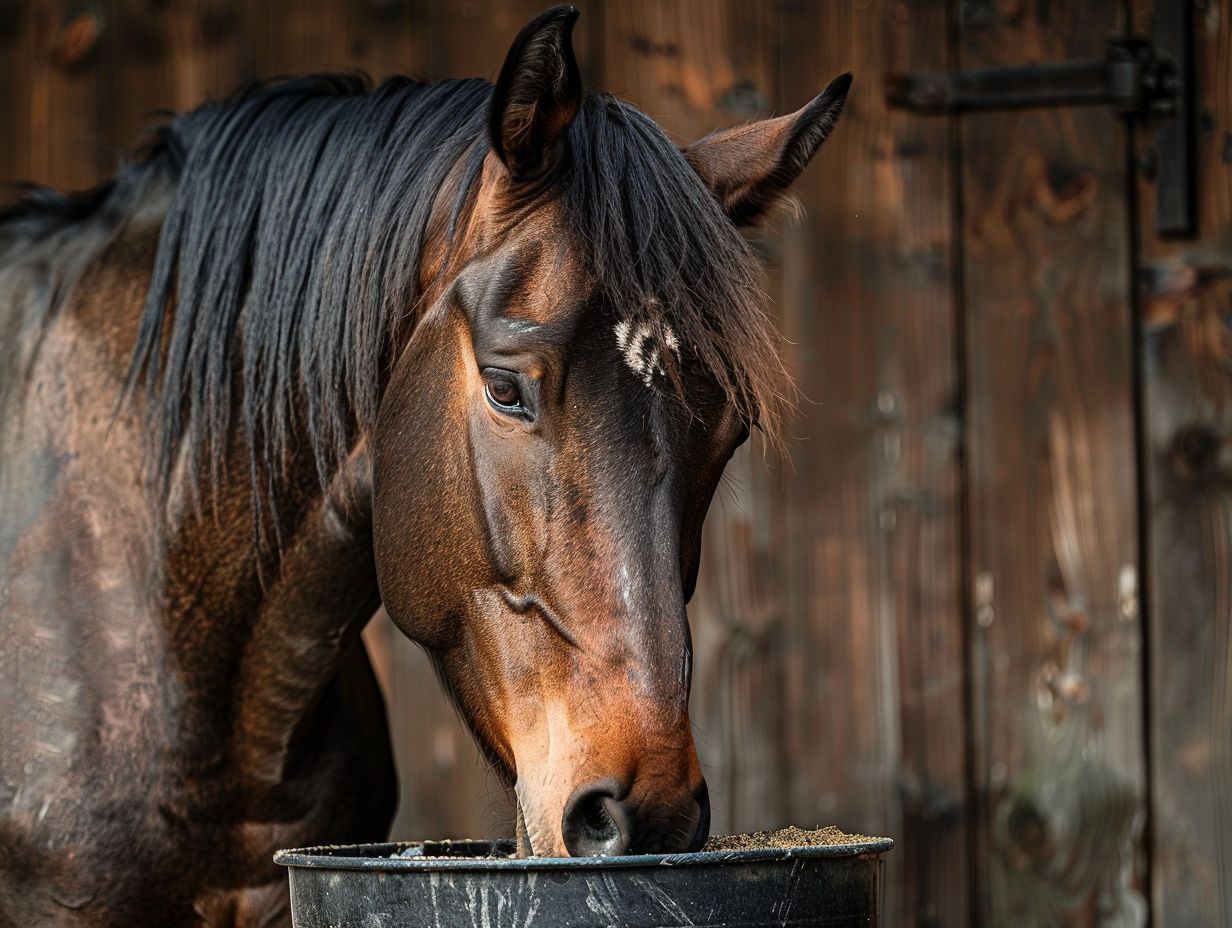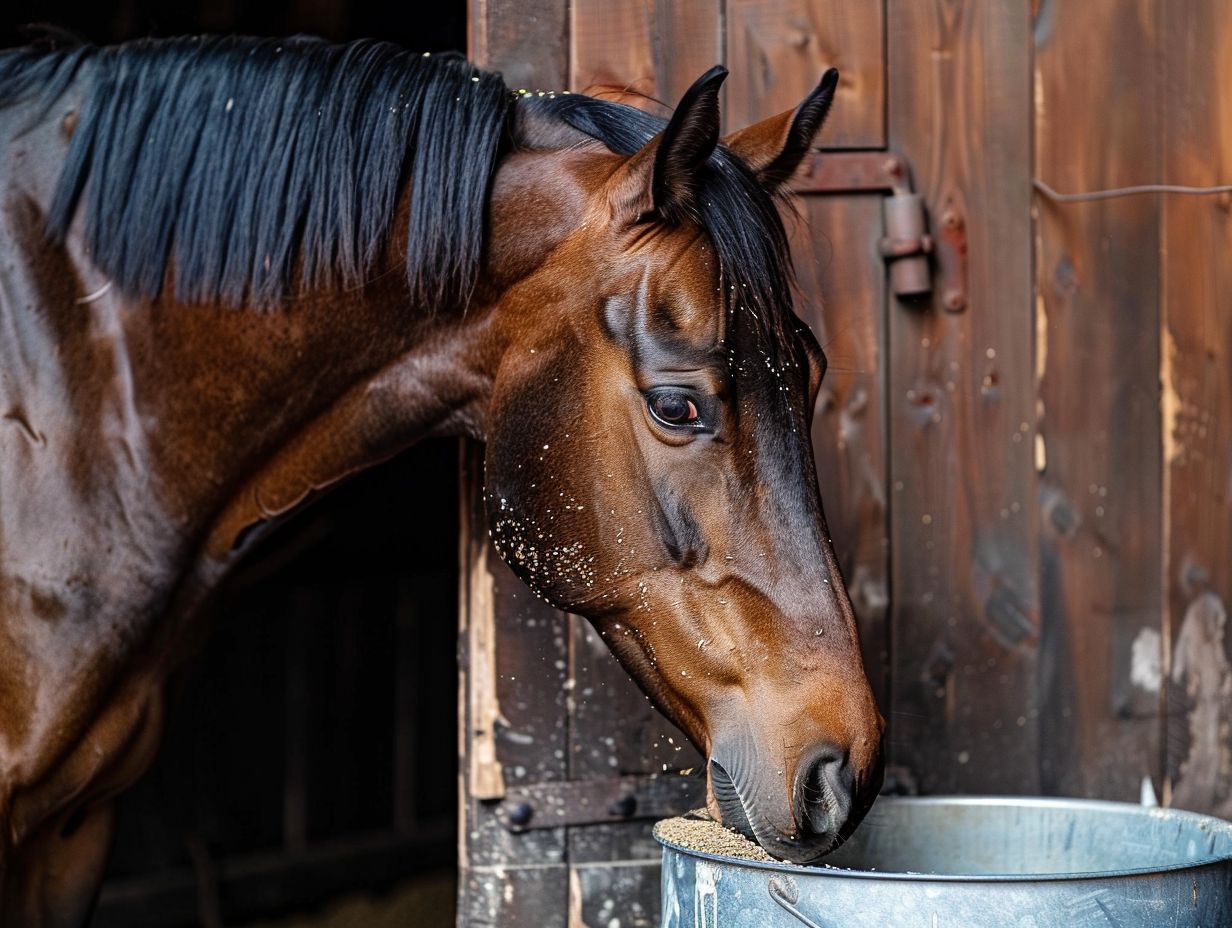If you are a horse owner, you may have considered the potential benefits of supplements for your equine companion.
In this comprehensive guide, you will be taken through the various types of horse supplements available, their potential advantages and drawbacks, and how to determine if your horse may require them.
Additionally, important considerations prior to supplementing your horse will be discussed, such as evaluating your horse’s nutritional requirements and seeking advice from a veterinarian.
Guidance will be provided on selecting the appropriate supplements, administering them correctly, and monitoring their impact on your horse.
Whether you are an experienced equestrian or a new horse owner, this article aims to assist you in making well-informed decisions regarding the health and welfare of your horse.
Understanding Horse Supplements

Understanding Horse Supplements is crucial for maintaining your equine companion’s optimal health and performance. A balanced nutrition plan, including essential vitamins and minerals, plays a vital role in supporting your horse’s overall well-being.
Ensuring that your horse receives adequate nutrition through supplements can address specific dietary deficiencies, boosting their immune system and promoting healthy digestion. Vitamins such as Vitamin A, B, C, D, and E are essential for proper muscle function, vision, and immune response. Minerals like calcium, phosphorus, magnesium, and zinc are crucial for bone strength, nerve function, and maintaining electrolyte balance.
By carefully selecting and incorporating the right supplements into your horse’s diet, you can enhance their longevity and performance levels for various activities.
Types of Supplements
When considering horse supplements, you will encounter various types, such as natural, herbal, organic, and synthetic formulations. Each type comes with distinct benefits and considerations relevant to your horse’s dietary needs and overall health.
Natural horse supplements are sourced from plants and minerals, known for their gentle and holistic approach in supporting equine health. Herbal supplements harness the natural power of herbs like chamomile or ginger to target specific health concerns or enhance the general well-being of horses. Organic supplements are crafted from ingredients grown without synthetic pesticides or fertilizers, guaranteeing a purer form of nutrition for your horse. Conversely, synthetic supplements are produced to deliver accurate doses of vitamins and minerals tailored to meet the exact dietary requirements of horses.
Benefits and Risks
When considering horse supplements, it is essential for you to weigh the benefits against potential risks. While supplements can enhance performance and support various bodily functions, there are also risks associated with improper usage or interactions with other substances.
For instance, certain supplements, if not administered correctly, may lead to adverse effects on the horse’s health. It is crucial that you consult with a veterinarian or equine nutritionist before introducing any new supplement to your horse’s diet. Understanding the ingredients, dosage requirements, and potential side effects is vital to ensure the safety and well-being of your animal.
Monitoring your horse’s response to the supplement and making adjustments as needed is key to maintaining a balance between reaping the benefits and minimizing the risks.
Signs that Your Horse May Need Supplements
Recognizing signs that your horse may need supplements is crucial for addressing potential deficiencies in its diet. Common indicators include changes in coat quality, hoof health, and immune system function.
Dull, rough hair coat, brittle or cracked hooves, and increased susceptibility to infections are all signals that your horse could benefit from additional nutritional support. A lack of essential vitamins and minerals can lead to poor skin and coat condition, as well as weakened hooves. A compromised immune system may result in frequent illnesses or prolonged recovery times from minor injuries.
By observing these symptoms closely, you can identify the specific deficiencies and choose the right supplements to bolster your horse’s overall health.
Identifying Deficiencies
Identifying deficiencies in your horse’s nutrition requires a comprehensive analysis of its diet, including an assessment of essential vitamins and minerals. Each horse has unique nutritional requirements that must be carefully considered to maintain optimal health.
By conducting a thorough nutritional analysis, you can identify any potential deficiencies in your horse’s diet. Factors such as age, breed, activity level, and overall health status are critical in determining the specific vitamin and mineral needs.
The process of deficiency assessment involves observing physical symptoms, conducting blood tests, and collaborating with a veterinarian or equine nutritionist to develop a personalized feeding regimen. It is important to regularly review and adjust individual dietary requirements to ensure that your horse is receiving the proper balance of nutrients for its overall well-being.
Factors to Consider Before Giving Supplements

Before introducing supplements to your horse’s diet, you should consider factors such as its specific nutritional needs and the importance of seeking professional advice. Consulting with a veterinarian can help determine the most suitable supplement regimen.
Veterinarians possess extensive knowledge about equine nutrition and can analyze your horse’s diet to identify any deficiencies. They take into account various factors such as age, breed, workload, and health conditions before recommending supplements. Professional guidance ensures that the supplements are not only appropriate for your horse but also administered in the correct dosage. Seeking expert advice can prevent potential interactions between supplements and other medications your horse may be taking. It is crucial to remember the value of consulting with equine nutrition specialists for a comprehensive approach to your horse’s dietary requirements.
Nutritional Needs of Horses
Understanding the nutritional needs of horses is crucial for tailoring their diet to support optimal health and performance. Factors such as age, activity level, and environmental conditions play a significant role in determining the ideal nutrition plan for each horse.
Horses have varying nutritional requirements based on their age; for instance, growing foals require diets rich in protein and minerals to support bone development, while senior horses may benefit from supplements for joint health and digestion. Horses engaged in high-intensity activities necessitate diets higher in energy to fuel their performance.
Environmental influences, such as grazing on lush pastures versus being stabled, can impact nutrient intake and digestion efficiency, underscoring the importance of customized diet planning to meet the individual needs of each horse.
Consulting with a Veterinarian
When introducing supplements to your horse, it is essential to consult with a veterinarian for tailored professional guidance. Veterinarians offer valuable insights into managing medical conditions and ensuring safe supplementation practices. They possess the expertise to evaluate your horse’s overall health, considering factors like age, breed, activity level, and existing medical issues.
By seeking their guidance, you can obtain personalized recommendations that address specific deficiencies or goals. Veterinarians play a crucial role in monitoring the effects of supplements on your horse’s well-being and making necessary adjustments to optimize its health. Their guidance guarantees that your horse receives the appropriate balance of nutrients, promoting long-term health and optimal performance.
Choosing the Right Supplements for Your Horse
When selecting the appropriate supplements for your horse, it is essential to read the labels, understand the ingredients, and evaluate the quality and nutritional analysis of each product. This thorough process ensures that the supplements meet your horse’s specific needs, which is crucial for their effectiveness.
To begin, carefully examine the label to gather important information such as the active ingredients, recommended dosage, and any specific warnings related to your horse’s health. Understanding these details will enable you to make informed decisions that align with your horse’s dietary requirements.
In assessing the ingredients, focus on identifying natural, high-quality components that have been scientifically proven to benefit equine health. Evaluating product quality involves verifying the manufacturer’s reputation, checking for certifications, and seeking feedback from other horse owners or professionals.
By emphasizing label scrutiny, ingredient comprehension, and product quality, you establish a solid foundation for choosing supplements that genuinely contribute to your horse’s well-being.
Reading Labels and Understanding Ingredients
When selecting horse supplements, it is crucial to read labels and understand the ingredients to differentiate reputable brands and evaluate market offerings. Opting for supplements from trusted brands guarantees quality and dependability in meeting your horse’s dietary needs.
By meticulously inspecting supplement labels, horse owners can gain valuable insights into the product’s composition, including essential vitamins, minerals, and active ingredients. This knowledge enables you to make well-informed decisions that align with your horse’s specific requirements and health objectives.
Understanding the source and quality of ingredients plays a vital role in preventing potential allergic reactions or adverse effects on your horse. Choosing supplements from established brands with a track record of product excellence and customer satisfaction offers reassurance that your horse is receiving safe and efficient nutritional support.
How to Properly Administer Supplements to Your Horse

Properly administering supplements to your horse involves understanding the correct dosage, frequency of administration, and the various factors that can impact absorption. Consistency in dosage and adherence to guidelines are essential to achieve optimal results.
When determining the appropriate dosage for your horse, it is important to take into account factors such as age, weight, and specific nutritional requirements. It is advisable to accurately measure the supplement using a calibrated scoop or syringe to ensure precision in dosing. Dividing the total daily dose into smaller, more frequent administrations can help maintain a consistent level of the supplement in your horse’s system. Factors like the type of supplement, quality of feed, and the overall health of the horse can all affect the absorption efficiency of the supplement. By addressing these factors thoughtfully, you can improve the effectiveness of supplement delivery to your horse.
Dosage and Frequency
Determining the appropriate dosage and frequency of horse supplements is essential for ensuring effective weight management and optimal metabolism. Tailoring the dosage to your horse’s needs and monitoring its response is key to achieving desired results.
Factors such as your horse’s age, activity level, and existing health conditions must be taken into account when deciding on the right supplement dosage. Adjustments may be necessary based on changes in your horse’s weight, metabolic rate, or response to the initial dosage. Proper dosage adjustments can aid in controlling your horse’s weight, supporting metabolism, and enhancing overall performance.
Understanding how specific supplements affect metabolic processes and weight control is crucial for maintaining a balanced and healthy equine diet.
Monitoring the Effects of Supplements on Your Horse
Monitoring the effects of supplements on your horse is essential for tracking progress, evaluating impacts, and identifying enhancements in health and performance. Regular monitoring ensures that the supplements are positively influencing your horse’s well-being.
By actively observing how your horse responds to the supplements, you can gain valuable insights into their health effects and performance enhancement. Monitoring enables you to identify any changes, whether positive or negative, in your horse’s condition and adjust the supplement regimen accordingly. This practice not only aids in maintaining your horse’s overall well-being but also plays a crucial role in optimizing their performance levels. Recognizing subtle improvements early on can lead to a more effective and targeted approach to supporting your horse’s health and performance.
Signs of Improvement or Adverse Effects
When administering supplements to your horse, it is crucial to observe for signs of improvement or adverse effects to evaluate the product’s impact. Monitoring for any potential allergies or sensitivities is important to ensure that the supplements are being well-tolerated and proving beneficial.
By carefully observing subtle changes in your horse’s behavior, coat condition, hoof health, and overall performance, you can assess how the supplements are positively influencing its well-being. Positive indicators to look out for include increased energy levels, improved muscle tone, better digestion, and enhanced coat shine.
Conversely, it is essential to monitor for signs such as lethargy, skin irritations, digestive upset, or behavioral changes, as these could indicate adverse reactions or allergies that require immediate attention. Adjusting the supplement regimen may be necessary in such cases.
Frequently Asked Questions
Do I need to give my Horse supplements?

It depends on your horse’s individual needs and diet. Some horses may benefit from supplements, while others may not require them.
What are some signs that my Horse may need supplements?
If your horse has a specific health condition, dietary deficiency, or is under a lot of physical stress, supplements may be beneficial. Consult with your veterinarian for personalized recommendations.
What types of supplements are available for Horses?
There are many different types of supplements for horses, including vitamins, minerals, joint support, digestive support, and more. It’s important to choose supplements that are specifically formulated for horses and to follow dosage instructions carefully.
Can supplements replace a balanced diet for my Horse?
No, supplements should not be used as a replacement for a balanced and nutritious diet. They should be used as a complement to a healthy diet and lifestyle for your horse.
Are there any risks associated with giving my Horse supplements?
Yes, there can be risks associated with giving your horse supplements if they are not used properly. Always consult with your veterinarian before starting any new supplements and carefully follow dosage instructions.
How do I choose the right supplements for my Horse?
It’s best to consult with your veterinarian to determine if your horse would benefit from supplements and which ones would be most suitable. They can also help you choose products from reputable brands and ensure they do not interact with any other medications your horse may be taking.


